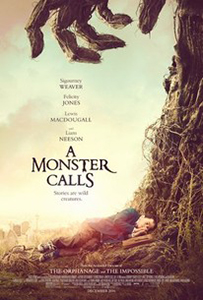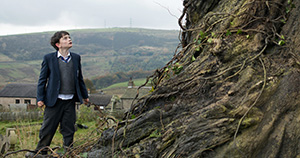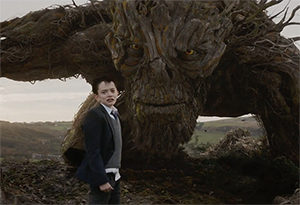The most frequent criticism of the book version of “A Monster Calls” is that it is overly dark and depressing. While that may be true, it speaks more to our sensibilities concerning death than to the reality of coping with the final act.
The original book was conceived by Siobhan Dowd as she was in the last stages of terminal cancer. Patrick Ness then took the premise and wrote “A Monster Calls,” earning both Dowd and Ness the Carnegie Medal and the Greenway Medal in 2012. There is a powerful, visceral message that cuts through the narrative that doesn’t fit our culturally accepted ideas of a happy ending. Targeted at children, this film isn’t the easiest watch for any age group. Younger children are likely to be scared by the imagery. Older children will walk away with many questions about mortality and the complex emotions death can bring to themselves and a family. These aren’t easy conversations to have with a child, but they are important to build trust, relationships, and an understanding of the truth of a terminal illness and death. As adults, we are tasked with aiding children through this process no matter how difficult or uncomfortable it makes us. These conversations are sad and depressing, but they are part of life.
A visually spectacular drama from director J.A. Bayona (“The Impossible”). 12-year-old Conor (Lewis MacDougall), dealing with his mother’s (Felicity Jones) illness, a less-than-sympathetic grandmother (Sigourney Weaver), and bullying classmates, finds a most unlikely ally when a Monster appears at his bedroom window. Ancient, wild, and relentless, the Monster guides Conor on a journey of courage, faith, and truth. (Synopsis by Focus Features)
This film follows the book nearly page-for-page, a rarity for literature based films. Granted, the book is barely longer than a hundred pages and the script was authored by Patrick Ness, but it is a testament to the strength of the story that almost no changes had to be made in the adaptation. As expected, the only thing that is really lost is some of Conor’s inner monologue that help explain his perspective of some of the plot points. The bullying story line is clunky in the book, offering a mixed interpretation of the bully’s intentions, but it’s even less well-defined in the film when there is little insight into Conor‘s perspective. Sigourney Weaver, playing the grandmother, never gains her own narrative arc as in the book, in which Conor realizes that she is carrying her own pain of losing her daughter. The only other major complaint here is some of the humor doesn’t quite work against the “feel” of the film. Again, it is fair to point out this was a problem in the book as well. Both instances feel like a half-hearted attempt to lighten the mood that never really pans out. This humor, or some lightness, needs to be in the script, but this is more of an execution problem than a content issue.
The strength of the cast is easy to overlook against the starkness of the script. Young Lewis Macdougall carries the difficult struggle of acting against several veterans and handles it with poise. The CGI monster fits perfectly into the film and Liam Neeson’s voice work matches the monster so perfectly that you forget it’s the actor. It is obvious that director J.A. Bayona was heavy influenced by his previous collaboration with Guillermo del Toro in his directorial and visual style. Bayona and Ness must have felt the weight of the theme as they add a scene at the end of the film that wasn’t included in the book to provide a slight uptick to the closure. These changes don’t always work, but in this case it is merited. Despite the heavy subject matter and the warning to parents, this is a well put together film with a well-intentioned message.
“See It/ Rent It/ Skip It”: See it. A testament to honesty and family in difficult situations is a lesson we can all use.
TWO AND A HALF STARS out of four.
Directed By: J.A. Bayona
Rated PG-13 for for thematic content and some scary images.
Runtime: 1 hr. 18 min.






Leave a Reply
You must be logged in to post a comment.